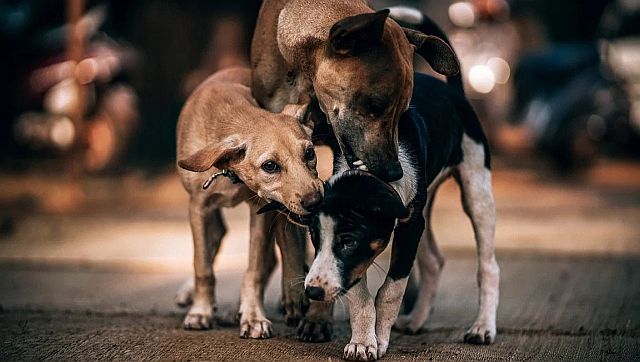How Delhi is dealing with its stray dog problem ahead of G20 Summit
The Delhi Municipal Corporation has put a halt to plans to pick up and hide hundreds of stray dogs before world leaders arrive in the city for the G20 summit next month. The plan was put on hold after locals and animal rights activists voiced opposition to it

Last week, on Wednesday, MCD released a circular stating that a large sterilisation programme for dogs will begin on Thursday (last week) and will continue until 30 August. AFP

Delhi has decided to stop its efforts to capture and conceal numerous stray dogs in preparation for the upcoming G20 summit, a local official said Sunday.
Since India took over the G20 presidency last year, Delhi has been undergoing extensive beautifying efforts. One such plan included to remove stray dogs near G20 venues, which was announced last week only to be withdrawn with an immediate effect after it upset the Delhi residents and animal rights activists.
“Action plan issued by this office (Municipal Corporation of Delhi) regarding picking of stray dogs from the vicinity of prominent locations of Delhi in view of the G-20 Summit is hereby withdrawn with immediate effect,” MCD’s Department of Veterinary Services announced through a circular on 5 August.
Related Articles
“…we realised that there is no special need for picking up all the dogs from the areas mentioned in the previous action plan due to the G20 Summit due to which we decided to withdraw our action plan,” The Indian Express reports an MCD official saying.
Last week, on Wednesday, MCD released a circular stating that a large sterilising programme for dogs will begin on Thursday (last week) and will remain until 30 August.
According to the circular, New Delhi’s municipal government would round up canines outside boutique hotels and popular tourist hotspots, and keep them at animal sterilisation centres until the summit was over.
The aim was to temporarily keep the stray dogs at the Animal Birth Control (ABC) centre before releasing them back to the same locations where they were picked up after the G20 summit.
However, the MCD decided to drop the proposal over the weekend, without stating a reason for abandoning their plan.
‘Illegal and impractical’
Local media reported that the dog-catching scheme had aroused opposition from Delhi residents and animal rights activists.
Ambika Shukla, a PFA Trustee termed the action as “arbitrary” and said that catching and confinement of stray dogs is both cruel and unnecessary.

Shukla Said in a statement: “Clearly, no planning or thought has gone into this initiative. No notice, no consultation, no procurement of nets, no staff training, no nothing. All ABC units are opposing this move as it is illegal, impractical and unwarranted.”
The statement further said that apart from being unnecessary, it is also illegal to pick up sterilised dogs, which is impractical.
“ABC centres are quick-release facilities and they do not have the space, staff, or infrastructure to house dogs for a month safely. The dogs are severely at risk from catching infections in such close and prolonged confinement,” the statement added.
Delhi’s strays
More than 60,000 stray dogs live on Delhi’s streets according to India’s Livestock Census of 2012, the most recent available government figures.
Sterilisation campaigns have been regularly employed by local authorities to keep the canine population in check, though dog packs remain present in parks and residential neighbourhoods around the city.
Many of Delhi’s strays are beloved by their adopted neighbourhoods despite lacking formal owners, with some dogs clothed in special canine jackets to keep warm during the city’s harsh winters.
GOOD NEWS
MCD order withdrawn – A delegation of @PFAppf @pfaindia met with the Mayor of Delhi yesterday and raised concerns about the proposed drive to remove street dogs.
The order issued by MCD on 4.8.2023, which was issued in suppression of the Action Plan of 3.8.2023 is… pic.twitter.com/QR3dOsDFTf
— Gauri Maulekhi (@gauri_maulekhi) August 5, 2023
But they are also a hazard to humans, with local media regularly reporting on the mauling of young children by aggressive dog packs across the country.
Roughly 17 million dog bites are reported across India each year and the World Health Organisation says that nearly 20,000 people nationwide die of rabies annually.
The Delhi metropolitan area, where about 30 million people live, has been working really hard to make the city more beautiful after India became the president of the G20.
Authorities have removed illegal slums near the places where the summit is going to happen. They have also improved the main roads in the city that are usually very crowded. The summit, happening in September, will gather leaders from the world's most important economies.
With inputs from AFP
also read

11-year-old found dead, stuffed in bed box at Delhi home; 'mysterious' woman suspect calls father after murder
The Delhi Police said, preliminary medical examination suggested that Divyansh died due to strangling. They suspect the woman seen in security camera of committing the crime

Delhi Legislative Assembly to be convened on August 16; first session after services bill passed in Parliament
The Delhi Assembly will assemble for the first time since the bill to replace the ordinance on control of services in the national capital has been passed in both houses of Parliament

Malviya Nagar Murder: Accused was girl’s cousin, wanted to marry her
The 22-year-old was was bludgeoned to death with an iron rod by her 'mentally disturbed' maternal cousin at a park near Aurbindo College in South Delhi's Malviya Nagar


